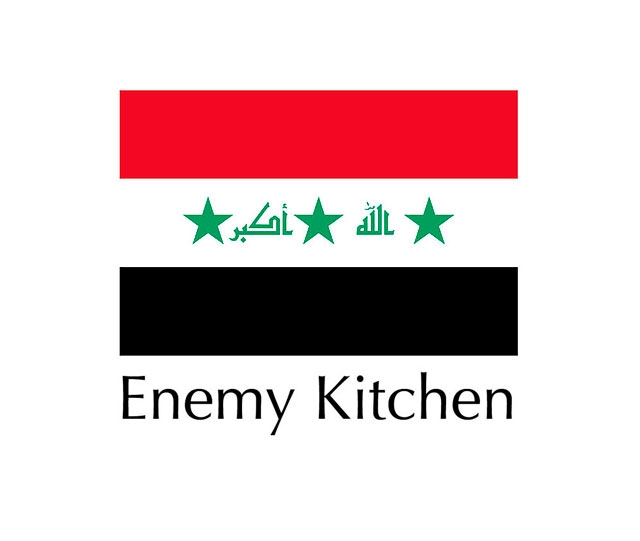
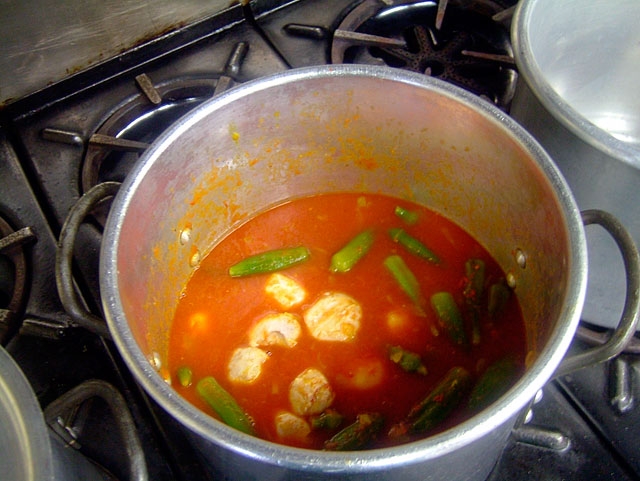
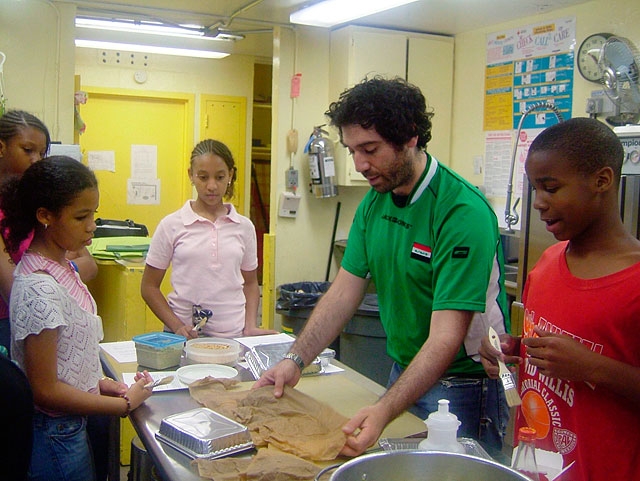
Making baklawa. Other dishes made with these students include kubba bamia, a meat dumpling stew served with okra over basmati rice.
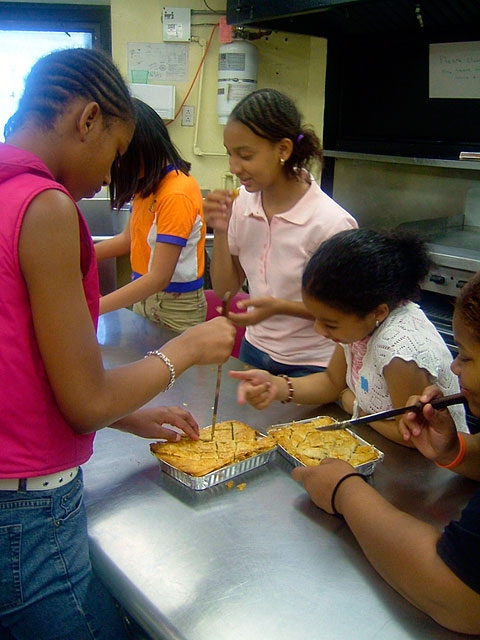
On one occasion, a student walked in and said, “Why are we making this nasty food? They (the Iraqis) blow up our soldiers every day and they knocked down the Twin Towers.” One student corrected her and said, “The Iraqis didn’t destroy the Twin Towers, bin Laden did.” Another said, “It wasn’t bin Laden, it was our government.” In this way, the project provided a space where the opinions, myths and facts that are perpetuated in a country during wartime could be communicated and discussed.
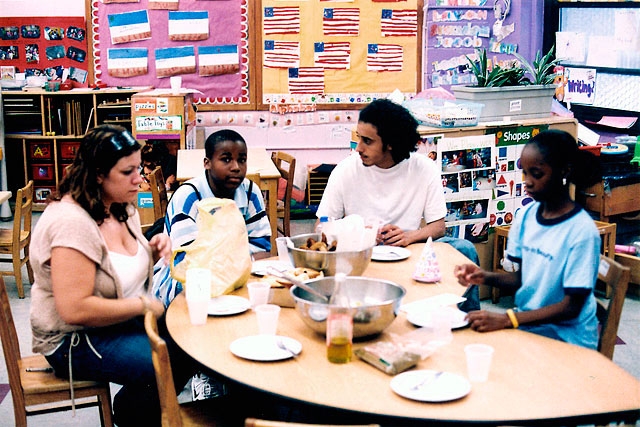
After eight weeks of learning how to cook Iraqi food, the students at Hudson Guild Community Center proposed to teach me something about their own families’ recipes, since they now knew so much about mine. One student, Hyasheem, asked, “Do Iraqis make Southern fried chicken?” I answered that no, to my knowledge there was nothing like it in Iraqi cuisine. “Well, then let’s invent it,” he said.
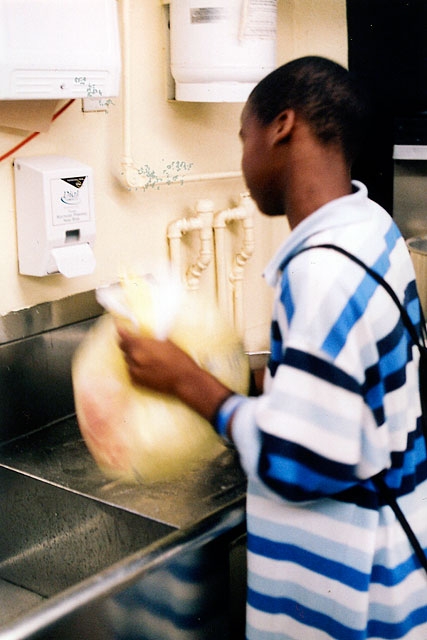
Hyasheem (pictured) led the way and we cooked the chicken according to his specifications, using a shake-n-bake technique.
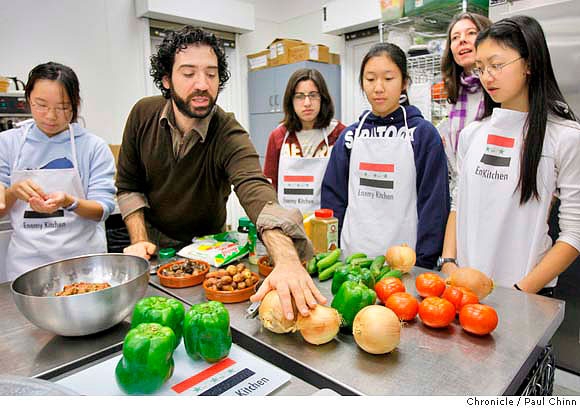
Cooking and eating a meal of amba salad, kubba, and debes wa’ rashi with students from Saratoga High School at Villa Montalvo at the Montalvo Arts Center in California. One student, named Connie Sheng, said “One day, it would be nice to know what it feels like to proud of my country.”
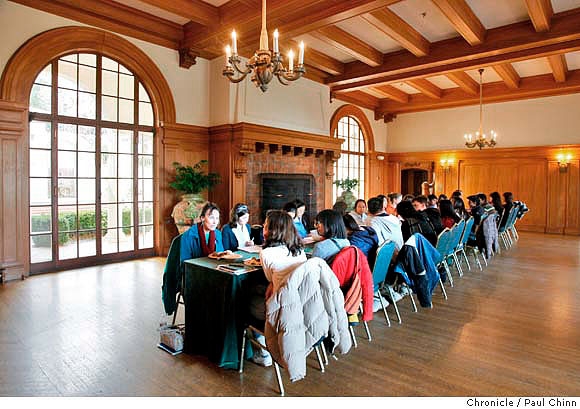
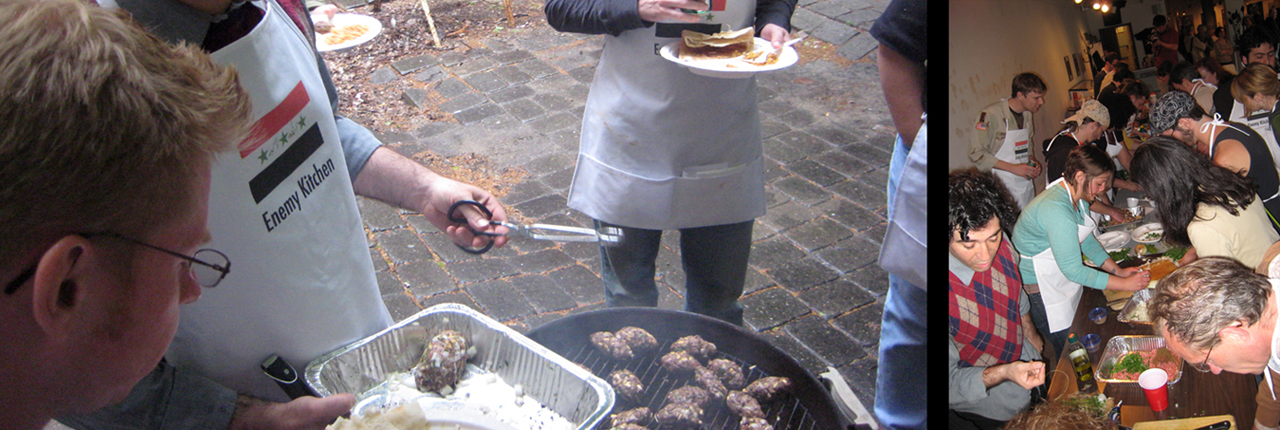
Enemy Kitchen barbecue at The National Vietnam Veterans Art Museum on Memorial Day, 2009. Together with members of the Chicago chapters of Iraq Veterans Against The War (IVAW) and Vietnam Veterans Against The War (VVAW), we cooked Iraqi kofta on the grill instead of traditional hot dogs and hamburgers.
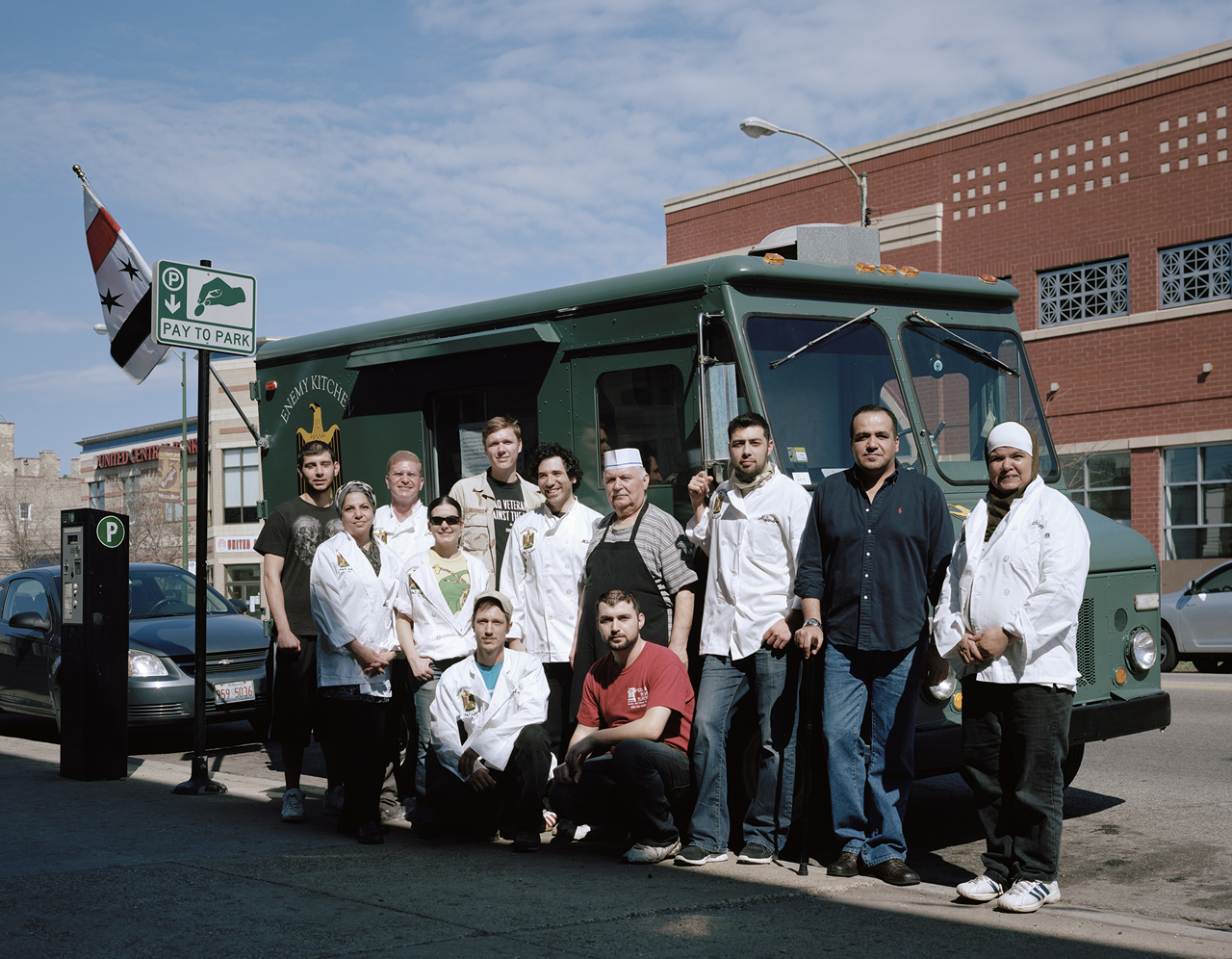
Enemy Kitchen staff, comprised of Iraqi refugees and American veterans of the Iraq War, outside of Milo’s Pita Place, an Iraqi restaurant in Chicago's Rogers Park neighborhood that operates the truck. Most Iraqi restaurants in the city call themselves Middle Eastern or Mediterranean to protect themselves from jingoistic attacks. Enemy Kitchen is the city's first Iraqi restaurant to publicly declare itself as such.
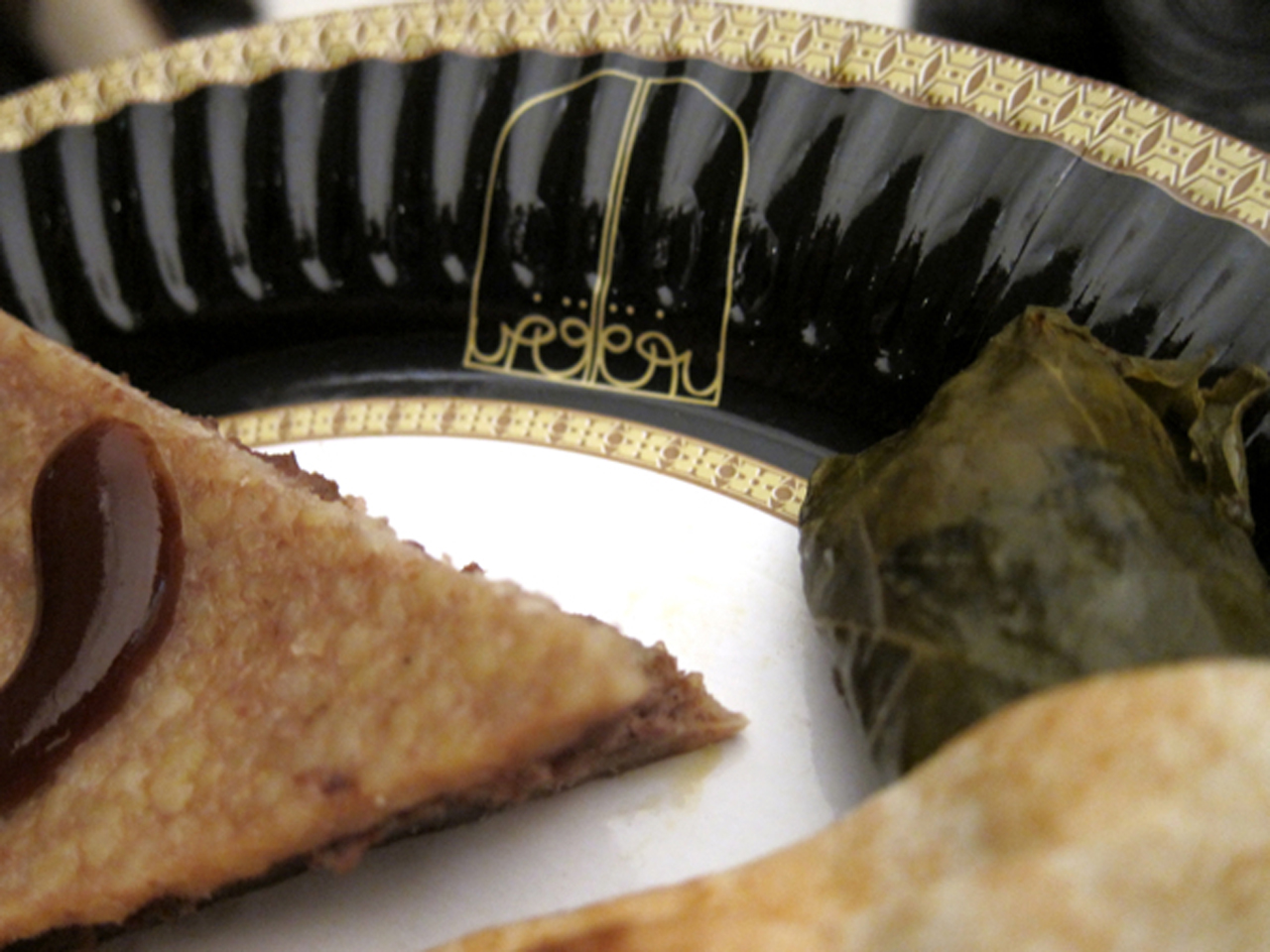
Detail of paper plate replicas of Saddam Hussein's dishes on which food is served from the Enemy Kitchen food truck.
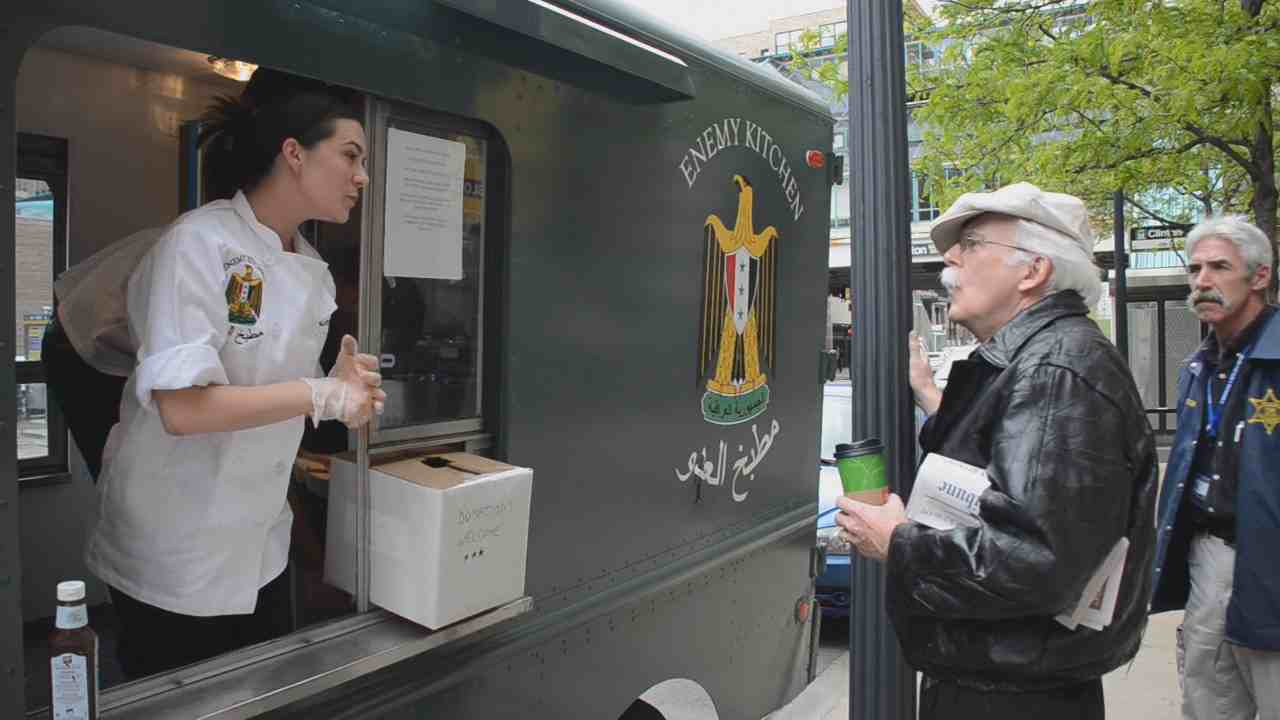
Enemy Kitchen is now a fully functional food truck on the streets of Chicago that features Iraqi refugee cooks and US veterans of the Iraq War serving as sous chefs. In this way, the power dynamic in Iraq is inverted, as Americans now take orders from the Iraqis. The truck features the Chicago flag, rendered in Iraqi colors and serves food on paper replicas of the plates looted from Saddam Hussein's palaces in 2003. (add to new image - slide 93)
The truck has made visible and audible the people on both sides of the war, as dialogue accompanies the serving and consumption of food, and the truck creates a critical social space.












Making baklawa. Other dishes made with these students include kubba bamia, a meat dumpling stew served with okra over basmati rice.
On one occasion, a student walked in and said, “Why are we making this nasty food? They (the Iraqis) blow up our soldiers every day and they knocked down the Twin Towers.” One student corrected her and said, “The Iraqis didn’t destroy the Twin Towers, bin Laden did.” Another said, “It wasn’t bin Laden, it was our government.” In this way, the project provided a space where the opinions, myths and facts that are perpetuated in a country during wartime could be communicated and discussed.
After eight weeks of learning how to cook Iraqi food, the students at Hudson Guild Community Center proposed to teach me something about their own families’ recipes, since they now knew so much about mine. One student, Hyasheem, asked, “Do Iraqis make Southern fried chicken?” I answered that no, to my knowledge there was nothing like it in Iraqi cuisine. “Well, then let’s invent it,” he said.
Hyasheem (pictured) led the way and we cooked the chicken according to his specifications, using a shake-n-bake technique.
Cooking and eating a meal of amba salad, kubba, and debes wa’ rashi with students from Saratoga High School at Villa Montalvo at the Montalvo Arts Center in California. One student, named Connie Sheng, said “One day, it would be nice to know what it feels like to proud of my country.”
Enemy Kitchen barbecue at The National Vietnam Veterans Art Museum on Memorial Day, 2009. Together with members of the Chicago chapters of Iraq Veterans Against The War (IVAW) and Vietnam Veterans Against The War (VVAW), we cooked Iraqi kofta on the grill instead of traditional hot dogs and hamburgers.
Enemy Kitchen staff, comprised of Iraqi refugees and American veterans of the Iraq War, outside of Milo’s Pita Place, an Iraqi restaurant in Chicago's Rogers Park neighborhood that operates the truck. Most Iraqi restaurants in the city call themselves Middle Eastern or Mediterranean to protect themselves from jingoistic attacks. Enemy Kitchen is the city's first Iraqi restaurant to publicly declare itself as such.
Detail of paper plate replicas of Saddam Hussein's dishes on which food is served from the Enemy Kitchen food truck.
Enemy Kitchen is now a fully functional food truck on the streets of Chicago that features Iraqi refugee cooks and US veterans of the Iraq War serving as sous chefs. In this way, the power dynamic in Iraq is inverted, as Americans now take orders from the Iraqis. The truck features the Chicago flag, rendered in Iraqi colors and serves food on paper replicas of the plates looted from Saddam Hussein's palaces in 2003. (add to new image - slide 93)
The truck has made visible and audible the people on both sides of the war, as dialogue accompanies the serving and consumption of food, and the truck creates a critical social space.